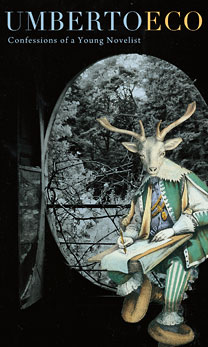Eco’s Confessions
An exquisite collection of essays about writing and reading
By Rebecca Rego Barry Rebecca Rego Barry is the editor of this magazine.
Confessions of a Young Novelist
By Umberto Eco;
Harvard University Press;
231 pages;
jacketed hardcover $18.95
Medieval scholar Umberto Eco published his first novel in 1980. That novel, The Name of the Rose, became an international bestseller beloved by bibliophiles. Set in a monastic library, the narrative follows Brother William of Baskerville as he investigates heresy, murder, and the missing manuscript of the second book of Aristotle’s Poetics. It was a seminal moment for the semiologist—at nearly fifty years old, he became a novelist.
In his new collection, Confessions of a Young Novelist, Eco offers glimpses of the processes and inspirations of becoming a so-called creative writer (a term he tackles). He discusses the boundary between fiction and non-fiction, asking us to contemplate what stories are real and why readers feel as strongly as they do about fictional characters. In content, this book is strikingly like one A. S. Byatt published in 2002, On Histories and Stories, and with reason: they both started out as Richard Ellmann Lectures in Modern Literature, Eco’s delivered at Emory University.
After The Name of the Rose, Eco contined to write fiction. His follow-up was the cerebral Foucault’s Pendulum (1989), and after that the fantastical The Island of the Day Before (1995). It would certainly be helpful for readers to have read at least one of these in order to fully enjoy Eco’s Confessions. He refers back to them often, pondering, for example, interpretations of the name “Casaubon” in Foucault’s Pendulum. Eco writes that he was thinking of Casaubon the Renaissance philospher, while readers connected his Casaubon to the one in George Eliot’s Middlemarch. Even Foucault is debated among his readers: Eco says Léon Foucault was the intended reference, but it is rather difficult for readers to ignore the more famous Michel Foucault. Intentions and interpretations are vastly intriguing topics, especially for a scholarly author and his sophisticated readers.
In the same essay, “Author, Text, and Interpretations,” he offers fellow bibliophiles the delcious detail that after the publication of The Name of the Rose, he became a rare-book collector, and one day while perusing his shelves he found a copy of Aristotle’s Poetics, printed in Padua in 1587, that he had purchased in his youth. As he examined the book, he noticed that it was unbelievably similar to the book in his novel.
I was holding in my hands, in printed form, the manuscript I had described in my novel. I had had it for years and years in my home, right on my shelf.
It was not an extraordinary coincidence, or even a miracle. I had bought the book in my youth, skimmed through it, realized it was badly soiled, put it away somewhere, and forgotten about it. But using a sort of internal camera, I had photographed theose pages, and for decades the image of those poisonous leaves had lain in the most remote part of my soul, as if in a grave, until the moment it reemerged—I do not know why—and I believed I had invented the book.
The last third of this collection focuses on a literary device of great interest to Eco: the list. In 2009 he published an entire book on the topic titled The Infinity of Lists: An Illustrated Essay. No doubt there is some overlap here, as he muses on his favorite lists in literature. A section on “Books, books, books” revels in the library catalogue as list.
Confessions appears in a delightful package—a handy size (close to duodecimo), well printed, with a lovely, somewhat irreverant jacket featuring Jacques Prévert’s collage Le Désert de Retz. Not that we should judge a book by these things, but they do suggest Eco’s accessibility and playfulness as an instructor here. To call Eco clever would be dull. The man is a genius. Readers, collectors, writers, scholars—hear his confession, you won’t be disappointed.








